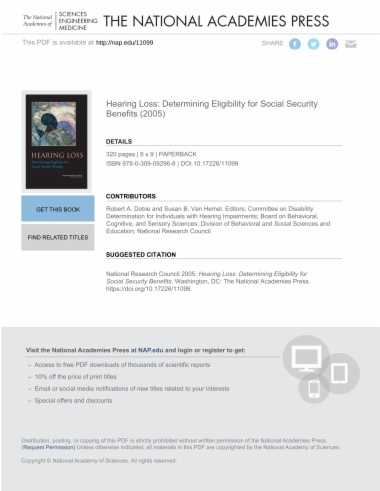Millions of Americans experience some degree of hearing loss. The Social Security Administration (SSA) operates programs that provide cash disability benefits to people with permanent impairments like hearing loss, if they can show that their impairments meet stringent SSA criteria and their earnings are below an SSA threshold. The National Research Council convened an expert committee at the request of the SSA to study the issues related to disability determination for people with hearing loss. This volume is the product of that study.
Hearing Loss: Determining Eligibility for Social Security Benefits reviews current knowledge about hearing loss and its measurement and treatment, and provides an evaluation of the strengths and weaknesses of the current processes and criteria. It recommends changes to strengthen the disability determination process and ensure its reliability and fairness. The book addresses criteria for selection of pure tone and speech tests, guidelines for test administration, testing of hearing in noise, special issues related to testing children, and the difficulty of predicting work capacity from clinical hearing test results. It should be useful to audiologists, otolaryngologists, disability advocates, and others who are concerned with people who have hearing loss.
- Cover
- Front Matter
- Executive Summary
- 1 Introduction
- 2 Basics of Sound, The Ear, and Hearing
- 3 Assessment of the Auditory System and Its Functions
- 4 Testing Adult Hearing: Conclusions and Recommendations
- 5 Sensory Aids, Devices, and Prosthesis
- 6 Impact of Hearing Loss on Daily Life and the Workplace
- 7 Hearing Loss in Children
- References
- Appendix A: Definitions and Technical Terms
- Appendix B: American National Standards on Acoustics
- Appendix C: Public Forum Participation
- Appendix D: Biographical Sketches of Committee Members and Staff
- Index

